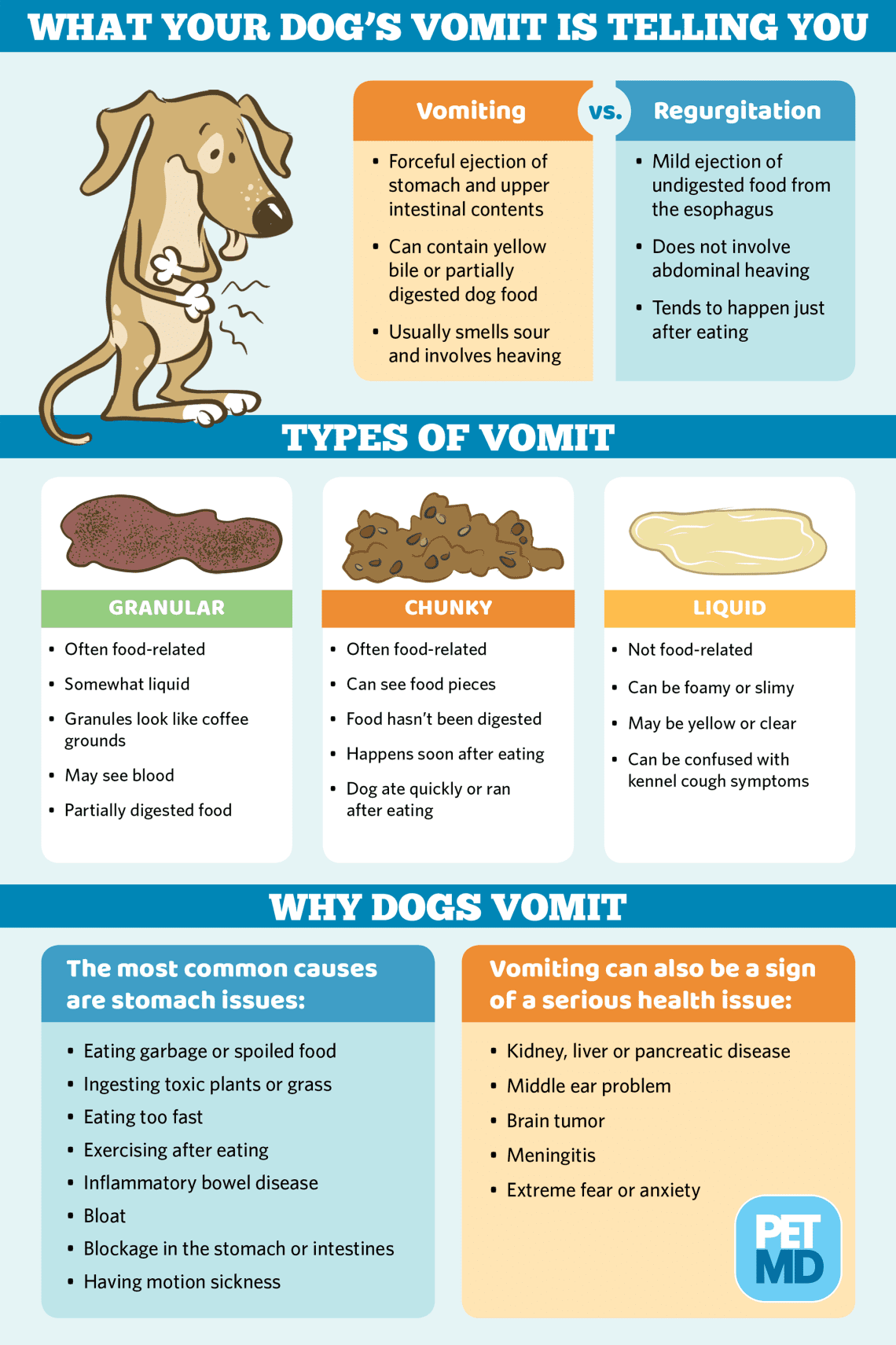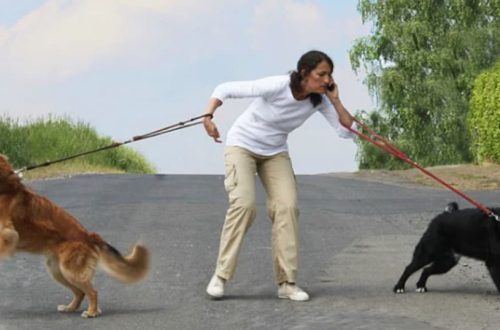
Vomiting in Dogs: Causes and Treatment
Vomiting, nausea, regurgitation – this is a phenomenon that does not become more pleasant by changing the name.
However, such problems occur with dogs quite often. There are many reasons why a pet may vomit, and some are usually more of a concern than others.
How to understand that a puddle of vomit left by a dog on the grass is not a sign of a serious problem? What to do if the dog vomited?
Contents
Dog spitting up and vomiting
It is important to understand the difference between vomiting and regurgitation. When spitting up, the expelled mass usually consists of undigested food, water, and saliva. It often comes out in a cylindrical shape, as regurgitated food or other substances exit directly from the esophagus. Outwardly, it passes without any effort and without muscle contraction, and most often there is no warning that something is about to happen.
Vomiting, on the contrary, is a much more active process. During vomiting, muscle contraction and tension of the whole body occur. When a dog vomits, the food or foreign body usually comes out of the stomach or upper small intestine.
Most likely, the owner will hear the urge to vomit and see undigested or partially digested food in the vomit. If food is rejected from the stomach, a clear liquid can be seen, and if from the small intestine, yellow or green bile can be seen. In addition, signs such as drooling, walking from corner to corner, howling, or loud gurgling sounds coming from the dog’s stomach can indicate the impending vomiting.
Vomiting in a dog: causes
Chagrin Falls Veterinary Center and Clinic identifies eight of the most common causes:
- Eating garbage, greasy food and waste from the table.
- Ingestion of bones, rubber balls, stones, wool, sticks and other foreign bodies.
- Intestinal parasites such as roundworms.
- Viral infections such as plague, parvovirus and coronavirus.
- Various diseases, including diabetes, cancer, and stomach ulcers.
- Ingestion of toxic substances such as rat poison, antifreeze, pesticides, or household medicines such as aspirin.
- Motion sickness.
- Stress, excitement or anxiety.
If the dog is spitting up, the reasons may be as follows:
- binge eating;
- too fast absorption of food;
- restlessness or overexcitement;
- expansion of the esophagus, as a result of which the normal process of moving food into the stomach is disrupted;
- Dog Breed: This condition can affect any breed, but is most common in Shar-Peis, German Shepherds, Great Danes, Irish Setters, Labrador Retrievers, Miniature Schnauzers, Newfoundlands and Wire-Coated Fox Terriers, notes Wag!.
What to do if your dog is vomiting and when to worry
Since vomiting in dogs is not uncommon, owners usually do not worry if such troubles occur episodically with a pet. But when should you start worrying?
North Asheville Veterinary Clinic notes that if a dog is vomiting, then you need to worry in the following cases:
- Presence of other symptoms. If your dog not only vomits, but exhibits odd behaviors such as sleeping too much, refusing to eat, or diarrhea, call your veterinarian.
- Traces of blood. If there is blood in the vomit or the dog’s vomit looks like coffee grounds or dried blood, you should contact your veterinarian. Blood can be a sign of a serious problem, such as a stomach ulcer or a sharp foreign object, such as a bone or a toy, in the dog’s stomach.
- Incessant vomiting. Episodic cases are not a cause for concern, but if the dog is vomiting regularly or excessively, you need to make an appointment with a specialist and find out the cause.
For any questions related to how the dog burps, you should contact your veterinarian.
What will the veterinarian do
The veterinarian will want to find out what exactly caused the condition in the pet and how it affects his well-being. For both spitting up and vomiting, your veterinarian will first check for foreign bodies such as a sock, bone, or other foreign object stuck in your dog’s throat or digestive tract.
If the specialist determines that the problem is frequent or sudden regurgitation, writes Wag!, he will look for problems related to the esophagus or stomach. He may also want to rule out causes such as accidental poisoning, cancer, gastric reflux, or esophageal enlargement.
The American Kennel Club believes that if vomiting occurs for an unknown reason, then the first thing to do is check the animal for infections and dehydration. The veterinarian will examine the dog’s stomach and small intestine and rule out medical problems such as kidney failure, diabetes, liver disease, and pancreatitis.
Vomiting in a dog: treatment
The veterinarian will determine the cause of the dog’s vomiting, and if the pet has enough home care, it will be necessary to treat the symptoms at home. The University of Washington College of Veterinary Medicine makes the following recommendations:
- Do not feed the dog for several hours, after consulting with the veterinarian about the exact timing. It is important to remember that dogs with certain medical conditions should not be denied drinking, so it is recommended that you first consult your veterinarian. With persistent vomiting, dehydration can be a real concern, so fluid intake is very important.
- Once the vomiting stops, feed your dog soft, low-fat food for a few days. Meals should be given in small portions three to six times a day. Gradually increase portion sizes and reduce the number of feedings as your dog transitions to regular food. If the veterinarian has advised not to water the dog, at the end of the period without drinking, water can be introduced slowly in small portions.
- If your dog is vomiting because he is eating too fast, a puzzle feeder might be one solution. This device will force the dog to eat more slowly, as it will have to work hard to get food.
- You can switch your dog to a higher quality food, such as Hill’s Science Plan Sensitive Stomach & Skin, which is categorized as easily digestible, balanced, and nutritious. Switching to a new food should be slow, and not in one day, otherwise you can only exacerbate the problem.
A dog that has vomited is not necessarily sick or in need of immediate veterinary attention. But if she has symptoms that cause serious concern, it is best to call a veterinarian. He will find out what the problem is and offer a solution. After that, it will be possible to stroke, scratch and hug your beloved pet again instead of cleaning the carpet from vomiting.
See also:
- Conjunctivitis in Dogs: Symptoms and Causes
- Dog Oral Care
- Signs of Dog Aging and Caring for an Elderly Pet
- Ear inflammation in a dog: causes, symptoms and treatment





